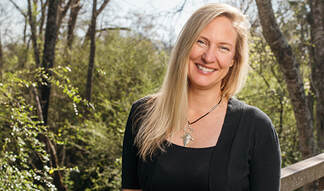Leslie Ruyle
Assistant Director, Scowcroft Institute of International Affairs | The Bush School of Government and Public Service

Dr. Leslie Ruyle is an ecologist working across disciplines to create innovative solutions for wildlife conservation and international development in conflict zones. Currently she serves as the Assistant Director and Associate Research Scientist at the Scowcroft Institute for International Affairs at the Bush School of Government and Public Service at Texas A&M University. She holds a PhD in Ecology from the University of Georgia, served as a Peace Corps Volunteer in Ghana, West Africa, and has managed university-based initiatives for the National Science Foundation and the United States Agency for International Development.
Having traveled to over 80 countries in her career, she has broad experience in international applied conservation and research including stints at the Savannah River Ecology Laboratory, Smithsonian Tropical Research Institute- Panama, Honduran Coral Reef Foundation, Applied Biodiversity Science Program, Earthwatch, and the Center on Conflict and Development. Her work has been recognized with the United Nation’s Equator Prize Initiative for Grass Roots Conservation, Texas A&M's AgriLife's Dean’s Award for Excellence in Interdisciplinary teams, Montana State University- Northern’s Founders Excellence Award, and the Bush School of Government and Public Service’s Award for Excellence. She teaches courses on Natural Resource Policy, Women, International Development, and Environmental Conflict, and Biodiversity Conservation Research. She has conducted research that includes the surveys of endo-parasites impacting the survival of C. melanosterna, identified the presence and persistence of malaria parasites in C. melanosterna, evaluated of stress levels with leukocyte profiles in C. melanosterna to assess capture techniques, and worked with the Mountain Gorilla Veterinary Project on their One Health program.
Her current projects include an entrepreneurship program for regions of conflict, conservation concern, and limited connectivity (EC3) in the Democratic Republic of Congo (DRC), the Boom and Bust Economics of Ebola in eastern DRC, and human-wildlife conflict workshops for local people and students to find solutions for farmers living near elephants, lions, leopards, wild dogs, jackals, and cheetahs in Botswana.
Having traveled to over 80 countries in her career, she has broad experience in international applied conservation and research including stints at the Savannah River Ecology Laboratory, Smithsonian Tropical Research Institute- Panama, Honduran Coral Reef Foundation, Applied Biodiversity Science Program, Earthwatch, and the Center on Conflict and Development. Her work has been recognized with the United Nation’s Equator Prize Initiative for Grass Roots Conservation, Texas A&M's AgriLife's Dean’s Award for Excellence in Interdisciplinary teams, Montana State University- Northern’s Founders Excellence Award, and the Bush School of Government and Public Service’s Award for Excellence. She teaches courses on Natural Resource Policy, Women, International Development, and Environmental Conflict, and Biodiversity Conservation Research. She has conducted research that includes the surveys of endo-parasites impacting the survival of C. melanosterna, identified the presence and persistence of malaria parasites in C. melanosterna, evaluated of stress levels with leukocyte profiles in C. melanosterna to assess capture techniques, and worked with the Mountain Gorilla Veterinary Project on their One Health program.
Her current projects include an entrepreneurship program for regions of conflict, conservation concern, and limited connectivity (EC3) in the Democratic Republic of Congo (DRC), the Boom and Bust Economics of Ebola in eastern DRC, and human-wildlife conflict workshops for local people and students to find solutions for farmers living near elephants, lions, leopards, wild dogs, jackals, and cheetahs in Botswana.
